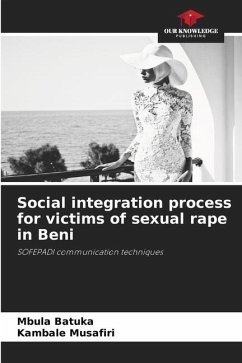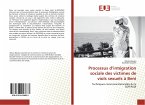In this book, we show how SOFEPADI's communication plays a part in the social integration of women victims of sexual violence in the town and territory of Beni. We used a survey of victims of sexual violence. The case study was also useful. This led to the issuing of a "Diagnosis" and a "Therapeutic" or solution. This method was accompanied by techniques such as documentation, observation, investigation, questionnaires and interviews. Violence against women in both the public and private spheres is becoming increasingly common. Women are banned from their families, their children, their husbands and even their communities. We therefore conclude that SOFEPADI makes less use of non-verbal communication in caring for victims of sexual violence in the Beni region, particularly in Oicha, where the care circuit is not reassuring.
Bitte wählen Sie Ihr Anliegen aus.
Rechnungen
Retourenschein anfordern
Bestellstatus
Storno








